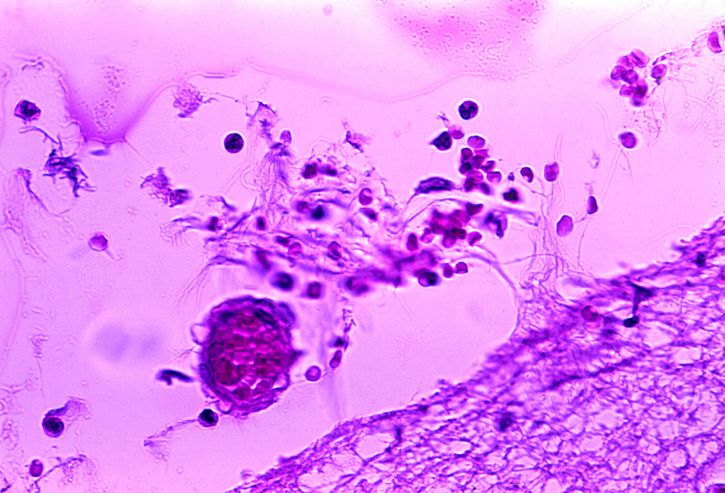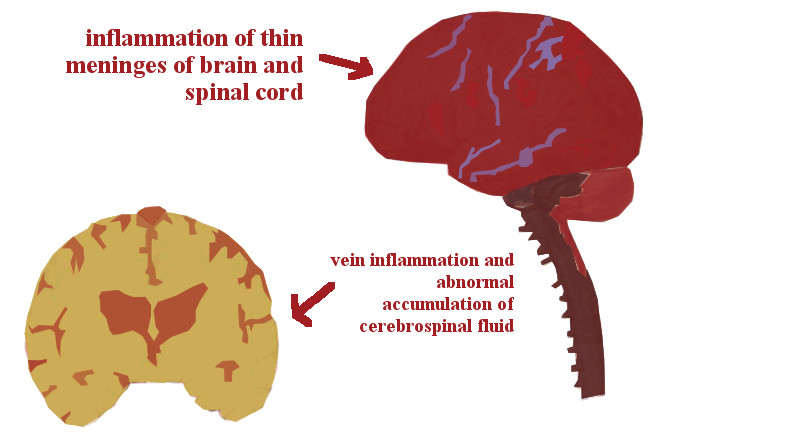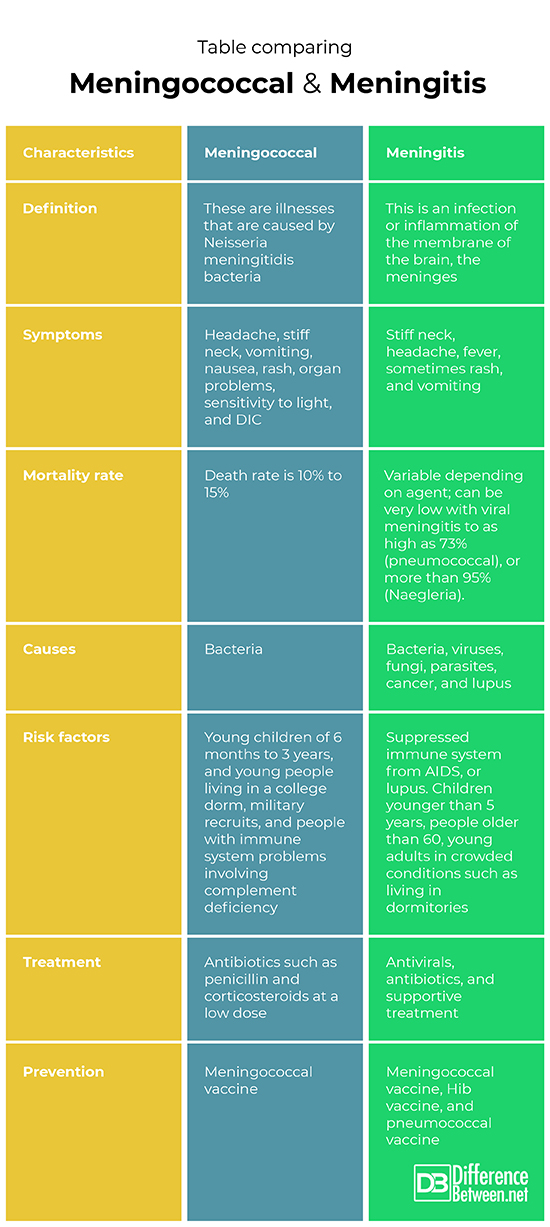Difference Between Meningococcal and Meningitis
What is Meningococcal?
Definition of Meningococcal:
Meningococcal illness is caused by specific bacteria named Neisseria meningitidis. Meningococci cause a form of meningitis along with other problems including septicemia (bacteria in the bloodstream).
Symptoms and complications:
Symptoms are severe and include headache, stiff neck, vomiting, nausea, rash, disseminated intravascular coagulation (DIC), and multiple organ problems including organ failure and shock. DIC is when abnormal blood clots form. There is also sensitivity to light (photophobia). In fact, there is a 10% to 15% risk of death and an 11% to 19% risk of permanent disability including amputation, deafness and brain damage.
Diagnosis of Meningococcal:
Meningococcal illness is diagnosed based on blood and cerebrospinal fluid (CSF) tests. Blood and fluid is collected and bacteria grown to confirm diagnosis. CSF is obtained by a lumbar puncture. Diagnosis is also confirmed by molecular tests such as PCR that can also identify bacteria.
Causes of Meningococcal:
Meningococcal illness is caused by the bacterium Neisseria meningitidis. There are different strains or serotypes of the bacteria that cause illness. People catch the illness by close contact with somebody who is ill, particularly if they have contact with oral secretions from an ill person.
Risk factors:
The group that is most at risk is children who are 6 months to 3 years of age. Others at high risk include teenagers, young adults living in dormitories, and military recruits. People who have problems with the immune system known as complement deficiency are also at high risk of contracting the illness.
Treatment and prevention:
Treatment includes antibiotics such as penicillin. Corticosteroids can sometimes help, but high doses of corticosteroids are not recommended as they can sometimes make the condition worse. The best option is to prevent catching the disease in the first place. The way to do this is to get vaccinated. There are several meningococcal vaccines available that are recommended for children and college-age students.
What is Meningitis?
Definition of Meningitis:
Meningitis is an infection and inflammation of the membranes of the brain, the meninges. It can be caused by bacteria, viruses, and very rarely even caused by fungi or parasites. There are many different types of meningitis including chronic and acute forms.
Symptoms and complications:
Meningitis symptoms include a fever, headache, stiff neck, and vomiting. Complications can include seizures, and deafness. Meningitis caused by Neisseria meningitidis can also lead to complications of amputation, organ failure, septic shock, and death. The death rates from meningitis vary greatly depending on the agent involved. Death from viral meningitis is very low but death rates from bacterial meningitis can be as high as 73% and in the case of Naegleria the death rate is more than 95%.
Diagnosis of Meningitis:
Meningitis is usually diagnosed by analysis of cerebrospinal fluid (CSF). Fluid is removed during a lumbar puncture, and then tested using PCR and by seeing if bacterial cultures grow. PCR and other molecular tests can show the presence of viruses and bacteria.
Causes of Meningitis:
Chronic meningitis can be caused by the bacterium Mycobacterium tuberculosis. People who have AIDS can become ill with meningitis caused by Cryptococcus bacteria. Viral meningitis is caused by enteroviruses, and is usually not as bad as bacterial meningitis. Bacterial meningitis can be caused by Neisseria mengitidis, Haemophilus influenzae (type b), and Streptococcus pneumonia. The parasite Naegleria fowleri causes a fatal form of meningitis, but luckily it is rare. People can catch meningitis from contaminated water, and oral secretions. Meningitis can even be caused by cancer or autoimmune diseases like lupus.
Risk factors for Meningitis:
A risk factor for meningitis is having a compromised immune system, such as having AIDS, or lupus or having cancer. Risk factors for bacterial meningitis include being younger than 5 years, or older than 60. Young adults living in dormitories or other crowded situations are also at high risk.
Treatment and prevention:
In the case of viral infections, antivirals can be tried, although they may not be effective. Antibiotics can be given for bacterial infections. Treatment may be more supportive in nature, and is often aimed at the agent causing the meningitis. Prevention by vaccination is strongly recommended. People should get the Haemophilus influenza type b (Hib) vaccine, and the meningococcal and pneumococcal vaccines.
Difference between Meningococcal and Meningitis?
Definition
Meningococcal illnesses are illnesses caused by Neisseria meningitidis bacteria. Meningitis is a disease in which the membranes of the brain become infected and inflamed.
Symptoms
Symptoms of meningococcal illness include headache, stiff neck, vomiting, nausea, rash, sensitivity to light, DIC, and fatigue. Symptoms of meningitis include stiff neck, fever, headache and sometimes rash and vomiting.
Mortality rate
The mortality rate of meningococcal illness varies from 10% to 15%. The mortality rate of meningitis varies depending on the cause. It can be very low in the case of viral meningitis to as high as 73% with pneumococcal meningitis, and over 95% with Naegleria meningitis.
Causes
Meningococcal is only caused by Neisseria meningitidis bacteria while meningitis can be caused by different bacteria, viruses, parasites, fungi, and even cancer and lupus.
Risk factors
Risk factors for meningococcal illness include being between 6 months and 3 years, living in a college dormitory or being a military recruit. Having an immune system deficiency such as complement deficiency is also a risk factor for meningococcal illness. Risk factors for meningitis include being younger than 6 years, older than 60 years, living in a college dormitory, having AIDS, lupus, or cancer.
Treatment
Treatment of meningococcal illnesses include antibiotics and low dose corticosteroids. Treatment of meningitis depends on the cause and may include antibiotics or antivirals.
Prevention
Meningococcal illness can be prevented with the meningococcal vaccine. Meningitis can be prevented with the meningococcal, pneumococcal and Hib vaccine.
Table comparing Meningococcal and Meningitis
Summary of Meningococcal Vs. Meningitis
- Meningococcal illnesses are only caused by the bacteria Neisseria meningitidis.
- Meningitis is the infection and inflammation of the membranes of the brain.
- There are many causes of meningitis.
- Vaccines are recommended for prevention of meningococcal illness and meningitis.
- Difference Between Constipation and Bowel Obstruction - April 3, 2024
- Difference Between Constipation and Diarrhea - March 30, 2024
- Difference Between Cellulite and Stretch Marks - March 25, 2024
Search DifferenceBetween.net :
Leave a Response
References :
[0]Image credit: https://upload.wikimedia.org/wikipedia/commons/e/e7/Bacterial_Meningitis.jpg
[1]Image credit: https://pixnio.com/science/microscopy-images/anthrax-bacillus-anthracis/mild-meningitis-with-hemorrhage-due-to-bacillus-anthracis
[2]Bush, Larry M. “Meningococcal diseases”. Merckmanuals. Merck & Co., 2018, https://www.msdmanuals.com/professional/infectious-diseases/gram-negative-cocci-and-coccobacilli/meningococcal-diseases
[3]Centers for Disease Control and Prevention. “Meningococcal disease.” CDC, 2017, https://www.cdc.gov/meningococcal/about/risk-community.html
[4]Greenlee, JE. “Subacute and chronic meningitis.” Merckmanuals. Merck & Co., 2017, https://www.msdmanuals.com/professional/neurologic-disorders/meningitis/subacute-and-chronic-meningitis#v8341076



